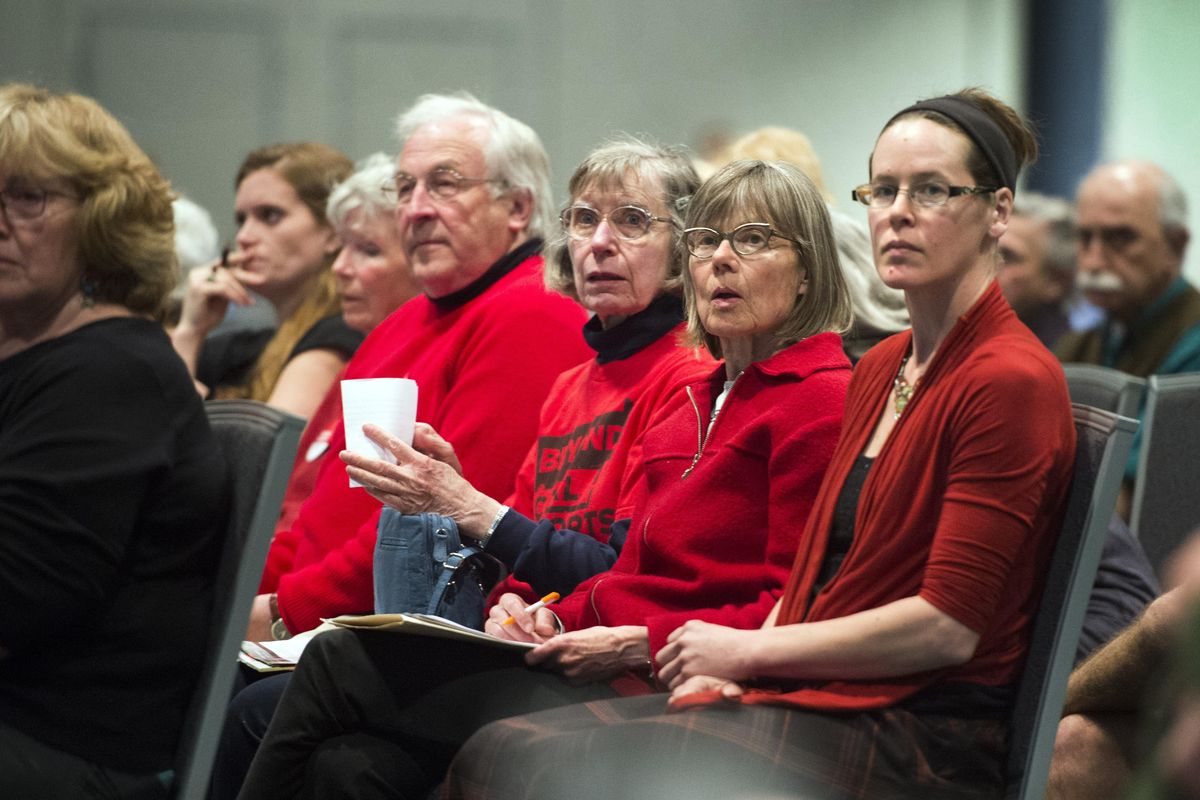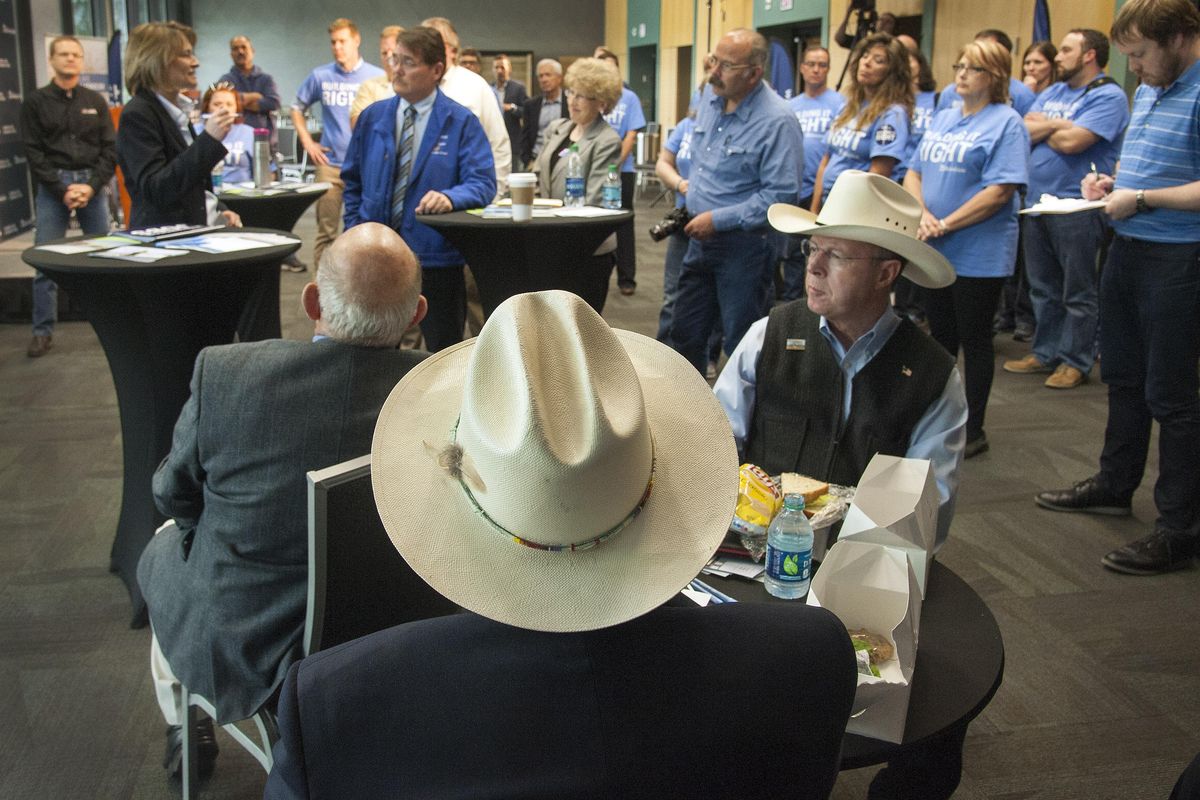Longview coal-terminal plan draws hundreds to all-day hearing in Spokane
Opponents of the proposed Millennium coal export terminal in Longview, Washington, wait for a turn to speak during a hearing, May 26, 2016, at the Spokane Convention Center. (Dan Pelle / The Spokesman-Review)Buy a print of this photo
A proposed coal-export terminal in Southwest Washington could eventually bring 16 more trains through Spokane each day.
Millennium Bulk Terminals would transfer coal from rail cars onto ships bound for energy-hungry markets in Asia. By 2028, the proposed Longview facility would export about 44 million metric tons of coal each year.
For some in the crowd at Thursday’s public hearing in Spokane, those were exciting numbers for Washington’s trade-based economy.
“Our state needs good blue-collar jobs and our state needs the revenue from those jobs,” said state Sen. Michael Baumgartner, R-Spokane. “We need more funding for education, for mental health and for public safety.”
Montana and Wyoming legislators also attended the hearing to support the project.
“This will not expand or create new mines,” said Montana Sen. Duane Ankney, R-Colstrip, whose district is part of the coal-rich Powder River Basin. “It will help us sustain mining at our current levels.”
But opponents urged Washington regulators to withhold approval for the terminal, saying the long-term impacts of global warming from coal combustion outweighed the job benefits.
“Coal has never been clean; it will never be clean,” said Dr. Gunnar Holmquist, a family practitioner in Spokane. “The coal we ship to Asia will affect every living thing on the planet. We’re all in this together.”
Hundreds of people turned out for the eight-hour hearing, one of three in the state.
David Hunt, a retired Spokane teacher and counselor, arrived at the Spokane Convention Center shortly after noon to sign up to testify. Five hours later, he was still waiting for his chance to speak, but he said he was willing to stay as long as necessary.
“In this day and age, it’s ludicrous for us to consider adding those emissions from coal extraction, transportation and burning,” Hunt said. “Millennium wants the profits from the project, but (society) would bear the costs to our health and the environment.”
The $680 million export terminal would be built on an old smelter site in Longview, said Wendy Hutchinson, vice president of public affairs for Millennium. The terminal would create about 1,000 jobs during a two-year construction phase and 135 permanent jobs.
The coal would be exported primarily to Japan and South Korea, U.S. allies and longtime trade partners, Hutchinson said. Japan recently announced it will build 42 coal-fired electrical plants as part of its plan to reduce nuclear power, she said. South Korea plans to add 10 coal-fired plants.
Hutchinson described the plants as high-efficiency and clean-burning.
“Electricity is a basic need, and coal makes electricity,” she said. “About 40 percent of electricity worldwide comes from coal, and we expect that to continue.”
If the terminal is built, the net increase in greenhouse gases would be between 1.4 million metric tons and 3.2 million metric tons annually, according to state modeling. The figures include the carbon released from burning the coal overseas.
At the highest level, the net impact is the equivalent to putting 672,100 more passenger cars on the road.
Millennium Bulk Terminals would be required to develop a plan to offset 50 percent of those emissions, according to the draft environmental review. That would be an unprecedented mitigation requirement, according to Hutchinson, who said Millennium only supports offsetting greenhouse gas emissions generated by operations at the Longview site.
Much of the coal would come from Montana and Wyoming, passing through Sandpoint and Spokane on BNSF Railway trains en route to Western Washington. Union Pacific also would transport some coal to the terminal through Oregon.
Rail capacity was one of the issues raised in an environmental review. About 70 trains daily pass through Spokane, which is nearing the existing lines’ current 76-train capacity, according to the analysis by the Washington Department of Ecology and Cowlitz County.
By 2028, the number of trains is expected to increase to 106 daily through the growth of other shipments on the line, the analysis said. The 16 additional coal trains – eight full, eight empty – would create more congestion, according to the analysis.
Ross Lane, a BNSF spokesman, said the railroad has been working to expand capacity in Washington with $421 million invested in capital projects over the past two years, and another $217 million in spending this year.
“Concerns about capacity are simply unfounded,” he said.
John Stuhlmiller, the Washington Farm Bureau’s chief executive, said his organization supports the coal-export terminal. The shipment of other high-value commodities by rail helps the agricultural industry, which also depends on rail transport, he said.
“About 90 percent of our product ships out of state,” Stuhlmiller said. “We need world-class, farm-to-market transport.”
But Spokane City Council President Ben Stuckart, who spoke against the proposal, said rail congestion is one of his concerns.
Drivers would experience longer waits at many train crossings, especially in Spokane Valley, the analysis said. Crossings at Park, Pines, Flora, Barker and Harvard roads all would experience significant increases in traffic delays.
Coal trains traveling at 50 mph would take more than two minutes to get through each crossing because of their length, according to the analysis. Trains carrying coal average about 125 cars, or about 1.3 miles, long.
Delays for emergency vehicles at crossings are already a problem, Stuckart said.
“Think about what 16 more trains would do at at-grade crossings,” he said.
If the terminal is built, Hutchinson said, the community could expect one to two more coal trains initially, with a gradual ramp-up in coal trains as track capacity is added.
Comments on the project will be accepted through mid-June. A final environmental review could be out later this year.
Spokane resident Nicole Marie Wallace said she came to the hearing on behalf of her 11-year-old daughter, who couldn’t play outside last summer during one of the worst wildfire seasons on record. The air was too smoky.
Climate change “is something we should have done something about yesterday,” Wallace said. “If we continue to dig up this coal and send it to Asia, it’s polluting here and it’s polluting there.”
This story was updated to correct Millennium Bulk Terminal’s position on mitigating on for greenhouse gas emissions.

